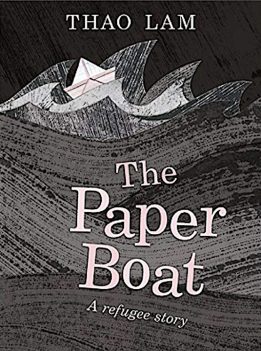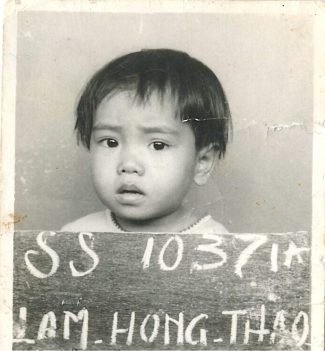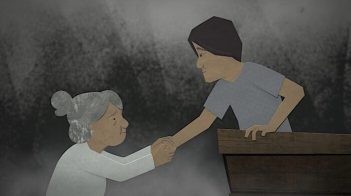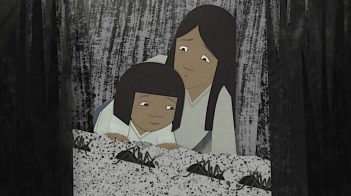By Valerie Milano

(Photo: Kevin C. W. Wong)
Palm Springs, CA (The Hollywood Times) 6/23/23 –Boat People (Canada, 2023) is a moving 10-minute short time by Thao Lam and Kjell Boersma that screened on Tuesday, June 20, 2023, in the Camelot Theatres in a set of six short films during the 2023 Palm Springs International Short Film Festival. In the film narrated by Thao Lam, she recounts the story of her family’s escape for war-torn Vietnam along with almost 1.6 million other Vietnamese between 1975 and 1995. Many of the refugees failed to survive the passage, facing danger from pirates, over-crowded boats, and storms. Thao Lam and her family escaped from Vietnam in 1980 when she was two years old, so she has always been curious to learn what her parents remember about their experiences. Boat People was conceived as a children’s book but the film is designed to reach a larger audience and, as Thao Lam explained in the interview, “even her own daughter could understand the film without having it explained to her.” So often, refugee families are more focused on succeeding in a new country rather than perseverating on the reasons for fleeing their homelands due to war and displacement.

Filmmaker, Animator
(Photo: Chetan Tilokani
 The book The Paper Boat and the film Boat People started development at the same time, but were independent of each other, though they deal with the same subject matter. Thao Lam’s 40-page book The Paper Boat is a fascinating, emotional, wordless picture book. The film is about the Vietnam War and being forced to flee as a refugee. In my interview with Thao Lam, she explained that she read many accounts of other Vietnamese refugees who left the country and had to “start over” in a newly adopted country – in her case, Canada. She was impressed by “the strength and endurance and leap of faith that these people had in relocating . . . to a country where they didn’t know the language and any one there.” On a personal level, her own family story is one of “resilience and hope.” Within the story is an allegory about ants. Thao Lam’s family came to Canada as refugees during the Vietnam War. When Thao started thinking about how to tell this story, she kept remembering her mother’s stories about ants: Small, seemingly insignificant creatures who are able to travel amazingly long distances overwater, work hard, and thrive on almost every continent on the planet. Having left Vietnam at age 3 and being raised in Canada, Thao Lam has little sense of what constitutes traditional Vietnamese culture. But she feels the story “resonates with any family that is a migrant.”
The book The Paper Boat and the film Boat People started development at the same time, but were independent of each other, though they deal with the same subject matter. Thao Lam’s 40-page book The Paper Boat is a fascinating, emotional, wordless picture book. The film is about the Vietnam War and being forced to flee as a refugee. In my interview with Thao Lam, she explained that she read many accounts of other Vietnamese refugees who left the country and had to “start over” in a newly adopted country – in her case, Canada. She was impressed by “the strength and endurance and leap of faith that these people had in relocating . . . to a country where they didn’t know the language and any one there.” On a personal level, her own family story is one of “resilience and hope.” Within the story is an allegory about ants. Thao Lam’s family came to Canada as refugees during the Vietnam War. When Thao started thinking about how to tell this story, she kept remembering her mother’s stories about ants: Small, seemingly insignificant creatures who are able to travel amazingly long distances overwater, work hard, and thrive on almost every continent on the planet. Having left Vietnam at age 3 and being raised in Canada, Thao Lam has little sense of what constitutes traditional Vietnamese culture. But she feels the story “resonates with any family that is a migrant.”

Like The Paper Boat, the film version starts with a story inspired by Thao’s mother’s life: a young girl watches as a bowl of sugar water are put out to attract (and get rid of) some pesky aunts. As the adults around her frantically make plans for escape, she dips her chopstick into the bowl to save the drowning insects. When the army arrives, the family must flee, and in the chaos, the girl and her mother become separated from the others and get lost in the jungle. The mother gives the hungry girl a bun wrapped in paper, which she then folds into a paper boat. After they eat, the girl spots a trail of ants in the moonlight. They follow the insects to water and manage to meet up with the boat that will take them to safety. Ants are capable of changing their role in an ant colony, as they age, and the older ones will often stay behind in order to help the others relocate when the colony is under attack. So does the old Vietnamese woman (who seems to be Thao Lam’s grandmother) save them in the rushes along the river.

The story quickly moves to Thao’s mother being reunified with her father and a long trip on the river to a refugee camp, where they stayed for six months before venturing in an open boat out from the Mekong River into the South China Sea. The original story switches to the perspective of a family of ants who have boarded the paper boat. Their journey is full of peril. The sun is relentless, the ants are attacked by seagulls, they starve, a storm capsizes their boat, and many ants are lost. The survivors, however, cling to each other, creating a raft of their own bodies, eventually making it to shore.

One ant ends up on a kitchen table, surrounded by food, much like the table from the first scene. In the film, this part of the original story has been simplified. But the members of Thao Lam’s family around this table aren’t quite the same. The grandmother is no longer there, the little girl has grown, and she’s been joined by a baby sister. But they seem happy, and most importantly, they are safe. As the story ends, the reader zooms out to see that they are but one family in an apartment building full of families, in a busy city full of apartment buildings full of tiny, seemingly insignificant creatures, working hard and thriving.

In interviewing Thao Lam, I learned that she is the critically acclaimed author/illustrator of THAO, Wallpaper, My Cat Looks Like My Dad, Skunk on a String, and The Paper Boat, named a best book of 2020 by Kirkus, Booklist, School Library Journal, the Globe and the Toronto Mail. In her picture-book telling of The Paper Boat, Thao returned to an earlier format of her own work: The wordless picture book of sequential art. But her artwork uses a collage of simple shapes, clean geometry, and impressionistic washes of color – which are replicated in the film. Its simplicity belies its great depth of feeling. In her film version of the story, she uses the same simple images as background for the 3D rendering done by co-director Kjell Boersma to capture the unique look of her hand-printed paper textures and patterns. But, unlike the wordless illustrated book, her film adds a narration with her own voice in a powerful, heartfelt way that really sounds like the voice of a little girl.

Another other interesting feature of this short film is the hybrid of traditional 2D animation, mixed with stop-motion multiplane and 3D rendering – which is largely the contribution of animator Kjell Boersma who has an impressive list of credits in his own animation and film work, including Dam! The Story of Kit the Beaver (2017) and the short film ‘Monster Slayer (2016). Boersma was first approached by Lam to co-direct and serve as animator on the film project. He was excited to do so because he felt that “she was equally invested in the project.” He has previously worked with her on the promo video for the book The Paper Boat. He was drawn to the film project because of the ants being the heart of the story.

This may be Thao Lam’s first venture into filmmaking but the result in her short Boat People is impressive. The film has been to a few international festivals of animation in Germany, Canada, and Poland. Hopefully it will get greater visibility at short film festivals, including Hollywood and the A.F.I. Because Boat People was produced by the National Film Board of Canada, it will be available online once its festival run is over. Boat People resonates with universal themes, speaking across time and culture to anyone who’s ever fought to protect the people they love.
Watch our Youtube interview from today and subscribe to The Hollywood Times:




